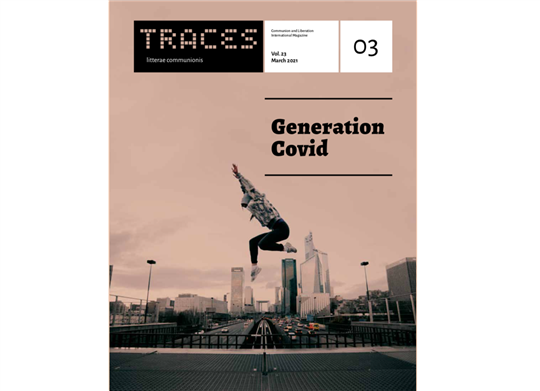
Traces N.3, March 2021
Generated right nowA year after the pandemic began, the data about how children and teens are suffering is alarming. And what would happen if we saw the same data about adults? We would see that today’s denialism is reducing the problem of education to classrooms and teaching methods, when instead we all face the same trials we see happening in young people.
Generation COVID. The meaning of this now-popular expression varies depending on what it refers to: whether to a generation that stands out because it has been traumatized by obstacles and “lost” time, or to a great opportunity to verify what is capable of generating a person’s desire to live.
“What can we do?” No question is more understandable today, especially when it comes from a parent. The reply, however, should be clear: “The meaning of life isn’t transmitted through our DNA.” The problem is the adults’, first of all, and it is “the deep fear that everything ends up in nothingness.” This is how Julián Carrón replied on January 30th during the online event, “Growing and Helping Others Grow During a Pandemic.” The evening was inspired by a letter some teachers in CL wrote to Corriere della Sera and by Carrón’s book Education: Communicating One’s Self, a contribution to the Global Compact convened by the pope in response to what he called “an educational catastrophe” to which “we must react.” But how can we react? When every effort seems doomed from the start, we need to be walking a road firsthand. “In a society like this, you cannot create something new if not with a life,” Giussani said back in 1978. “There is no structure, or organization, or initiative that can last. Only a different and new life can revolutionize structures, initiatives, relationships, everything.” In this issue, you will find the stories of people who communicate the gift that sustains this life and who respond to that urgent need for meaning, for oneself and for others, a gift that transcends the confines of a classroom, geographic location, profession, age, or circumstance. These stories tell us that everything educates us, from the way we work and return home to the way we face pain or watch a movie.
Education is always running against the wind, we have heard people say lately. It takes something special to rise up with more power than the wind: in a state of apathy, only a person who speaks to our deep need to be loved gets us moving. Like Antonio, for example, who started teaching after age 50, exactly one month before COVID stopped the world in its tracks. In the conversation held on January 30th, he gave a moving account of what happened with his students: they were overtaken by a gaze on reality that he had met when he encountered a Christian people. “If we have not been looked at in a true way, we cannot look at others in a true way,” Carrón concluded on that evening. “Better–if we are not looked at now! If we are not generated now.”